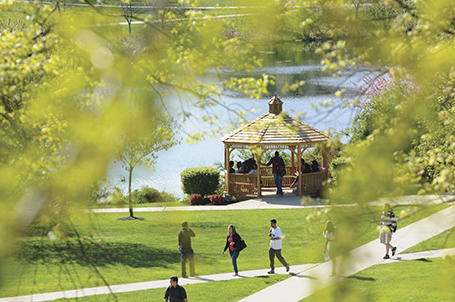Wednesday, Apr 30, 2014
The University was once again identified as one of the 332 most environmentally responsible colleges in the U.S. and Canada
by Kristine A. Brown
Rider University is one of the 332 most environmentally responsible colleges in the U.S. and Canada, according to The Princeton Review. The education services company known for its test prep programs and college rankings, ratings, and guidebooks profiles Rider in the fifth annual edition of its free downloadable book, “The Princeton Review's Guide to 332 Green Colleges."
The Princeton Review chose the schools for this guide based on a survey it conducted in 2013 of administrators at hundreds of four-year colleges to measure the schools' commitment to the environment and to sustainability. The institutional survey included questions on the schools' course offerings, campus infrastructure, activities and career preparation.
The 216-page guide can be downloaded at www.princetonreview.com/green-guide and www.centerforgreenschools.org/greenguide.
The Princeton Review created its "Guide to 332 Green Colleges" in partnership with the Center for Green Schools at the U.S. Green Building Council (USGBC).
“We are honored to be named one of Princeton Review’s Green Colleges for the fifth year in a row," says Melissa Greenberg, sustainability manager at Rider. "Sustainability and our commitment to ‘going green’ is evident all throughout our campuses. Rider remains committed to making our campus more economically, environmentally and socially sustainable, through our infrastructure and activities that encourage behavior change that allow our community members to be better stewards of our planet. Being recognized for this work by the Princeton Review is especially gratifying.”
The 322 school profiles in the guide feature essential information for applicants – facts and stats on school demographics, admission, financial aid – plus write-ups on the schools' sustainability initiatives. A "Green Facts" sidebar reports on a wide range of topics from the school's use of renewable energy sources, recycling and conservation programs to the availability of environmental studies and career guidance for green jobs.
In the guide's profile on Rider, The Princeton Review highlights the University’s “Broncs Go Green” initiative, the driving force for sustainability on campus, as defined by the four R’s: reduce, reuse, refuse and recycle. The publication also notes Rider’s team of student Eco-Reps and a newly formed volunteer “green team” in its profile. Additionally, Rider’s growing minor in sustainability studies, its Energy and Sustainability Master Plan, Green Film and Speaker Series, as well as campus honeybee hives, community garden and water bottle refill stations, were all highlighted by The Princeton Review as Rider’s “Green Highlights.”
Rider pledged to meet the USGBC’s LEED standards when President Mordechai Rozanski signed the American College & University Presidents Climate Commitment, directing that all further new campus construction would be LEED certified to a silver level as the minimum. certified. The University’s West Village residence halls, which opened in fall 2009 on the Lawrenceville campus, represented the first new construction since the Climate Commitment was signed by Rozanski. They were certified LEED Silver shortly after their completion.
In fall 2011, the 21,000-square-foot North Hall academic building was also completed, meeting LEED Gold certification standards.
West Village and North Hall were both designed by Spiezle Architectural Group, Inc., an award-winning, full-service architectural and sustainable design firm from Trenton. Spiezle is noted for its expertise in and commitment to sustainable construction.
Rider’s Lawrenceville campus is also home to a .74-megawatt (MW) solar farm that includes more than 2,600 ground-mounted crystalline solar panels connected directly to PSE&G’s power grid. The solar farm, which provides enough electricity to power about 125 homes annually, was completed in fall 2011.
A new Tri-Generation plant is currently under construction on Rider’s Lawrenceville campus, expected to be completed in the summer of 2014. The 2,700-square-foot-plant will provide heating, cooling and electricity to a large majority of campus.
"We are pleased to recommend Rider to the many students seeking colleges that practice and promote environmentally-responsible choices and practices," says Rob Franek, senior vice president and publisher of The Princeton Review.
Franek notes his company's recent survey findings indicating significant interest among college applicants in attending "green" colleges. "Among 10,116 college applicants who participated in our 2014 'College Hopes & Worries Survey,' 61% said having information about a school’s commitment to the environment would influence their decision to apply to or attend the school," he says.
Rachel Gutter, director of the Center for Green Schools at the U.S. Green Building Council, says, "In collaborating with The Princeton Review on this annual guide, we have seen that sustainability on campuses continues to be an important deciding factor for today’s four-year college bound students. We are excited to once again provide prospective students and their parents with a resource to help them navigate this often daunting decision-making process.”
The Princeton Review chose the schools based on a survey the company conducted in 2013. The survey asked administrators at hundreds of colleges across the U.S. and Canada about their institution's sustainability-related policies, practices, and programs. Using survey data that covered more than 25 fields, The Princeton Review tallied its "Green Ratings" (scores from 60 to 99) for 832 schools and reported them in the school profiles on the company's website and in its college guides in summer 2013.
The 332 schools in this guide received scores of 83 or above in that assessment. (Note: The Princeton Review does not rank the schools 1 to 332, nor does it report their Green Rating scores in this book.) Information about the Company's Green Rating and its "Green Honor Roll" list of 22 schools that received the highest possible score, 99, is at www.princetonreview.com/green.aspx.

